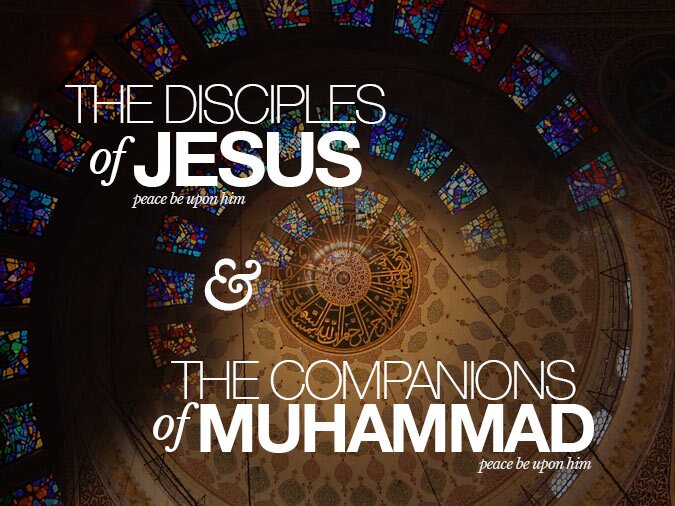Jesus’ Disciples and Muhammad’s Companions: A Comparison
Prophet Jesus (peace be upon him) was sent to the Children of Israel and was in need of individuals to support him. Similarly, the Companions of the Prophet Muhammad (peace be upon him) were his helpers and disciples. The Qurʾān speaks highly of the disciples of Jesus (peace be upon him) by highlighting their faith, conviction, and sacrifice. The Qurʾān calls on the Companions of the Prophet Muhammad (peace be upon him) to be like the disciples of Jesus:
O you who have believe, be helpers of Allah as when Jesus the son of Maryam said to the disciples: “Who are my helpers for Allah?” The disciples said: “We are Allah’s helpers (anṣār Allāh).” So a group of the Children of Israel believed and another group disbelieved. So We aided those who believed against their enemy and they prevailed. (Q 61:14)
The Parallel Between the Disciples of Jesus and the Companions of Muhammad (peace be upon him)
This verse establishes a parallel between the Prophets, Muḥammad and Jesus, (peace upon them both). Allah asks the Companions of the Prophet (peace be upon him) to be his helpers (anṣār), as Jesus (peace be upon him) had requested his followers. The disciples of Jesus (peace be upon him) had pledged to dedicate their lives to supporting him in conveying, propagating, and practicing the guidance of Allah; this is precisely what the Anṣār of Madina did for the Prophet Muhammad (peace be upon him), hence they were given the title al-Anṣār. They came to his aid when the young and small Muslim community most needed such help.
The Prophet Muḥammad (peace be upon him) had been seeking aid from pilgrims visiting Mecca. Twelve such visitors from Madina accepted Islam and agreed to aid him, in what came to be known as the first pledge of ʿAqaba, which took place in the eleventh year of the Prophet’s mission. The next year, seventy-two (or seventy-three) Madinans pledged to support the Prophet (peace be upon him) and fight by his side. The Children of Israel had twelve leaders (nuqabāʾ) at the time of Prophet Mūsā (upon him peace): And Allah took a covenant from the Children of Israel, and We delegated from among them twelve leaders (Q 5:12).
During the second Pledge of ʿAqaba, the twelve Madinan leaders were given the title of nuqabāʾ (leaders), and by most accounts were considered the close disciples of the Prophet Muḥammad (peace be upon him).
Jesus and Muhammad: Similarities Between Their Disciples
The situation of Jesus (peace be upon him) and the disciples was similar to that of the Prophet Muhammad (peace be upon him) and his Companions in Mecca. The verses of Q. 61:14 were revealed after the treaty of Ḥudaybiya, which took place in the sixth year after hijra, while the conquest of Mecca was at sight. This might explain why the verse that precedes the mention of Jesus (peace be upon him) and the disciples (Q. 61:13) speaks of a “victory near at hand” (fatḥun qarīb).
Being that the Meccan period resembled the situation of Jesus (peace be upon him) and the disciples, the verse highlights the zeal and support of the disciples as an example for the Prophet’s Companions. Jesus (peace be upon him) sought the disciples to be his helpers (anṣār) against the disbelievers, as in the verse So We aided those who believed against their enemy and they prevailed (Q 61:14). Although exegetes agree that Jesus (peace upon him) did not take up arms, some note that after he was raised to the heavens a battle broke out between his followers and those who disbelieved in him. Other scholars note that this victory mentioned in the Qurʾān refers to their prevailing in argument, not in battle.
Ṭabarī notes that three factions of Israelites emerged in his wake: one which claimed Jesus was God, one which considered him the son of God, and one which held that he was a Messenger of God. As indicated in the verse, the last group prevailed due to their evidences and proof against the other groups. Moreover, the emergence and triumph of the message of the Prophet Muḥammad (peace be upon him) was typologically a victory of the disciples of Jesus (peace be upon him) because their message ultimately prevailed over the beliefs of the disbelieving parties through the victory of the Prophet Muḥammad (peace be upon him).
The Helpers of the Prophet Muhammad (peace be upon him): A Special Rank in the Qurʾān and Ḥadīth
Just as the disciples held special rank among their community, the helpers of the Prophet Muḥammad, (peace be upon him) enjoy an exalted position in the Qurʾān and Ḥadīth. The Prophet (peace be upon him) stated: “Only a believer loves the Anṣār, and only a hypocrite hates them. So Allah will love him who loves them, and He will hate him who hates them” (Bukhārī).
The Prophet (blessings and peace upon him) also said, “There is no Prophet who was sent by Allah to a nation before me except that he had disciples (ḥawāriyyūn) and Companions among them” (Muslim).
During the campaign of al-Aḥzāb which took place during the fifth year after hijra, the Prophet (peace be upon him) thrice asked his Companions which of them would reconnaissance the disbelieving camp, and al-Zubayr volunteered himself each time. The Prophet (peace be upon him) declared about his exceptional effort, “Every Prophet has a disciple (ḥawārī) and my disciple is al-Zubayr” (Tirmidhī). This hadith echoes a story related in commentaries on Q 61:14 in which a young disciple volunteered to take the place of Jesus (peace be upon him) when he was to be crucified. Since some Prophet’s did not have any followers, the hadith is understood in a general and not universal sense, given other hadiths which include passages such as the following: “The nations were shown to me; I saw some Prophets who had a group of followers, and another Prophet who had one or two followers, and a Prophet who had no followers” (Muslim).
This is not to say that Muhammad and Jesus (peace be upon them) were identical, but that they had some common themes and experiences in their lives. Prophet Muhammad (peace be upon him) said: “Both in this world and in the Hereafter, I am the nearest of all people to Jesus, the son of Mary. The prophets are paternal brothers; their mothers are different, but their religion is one.” (Bukhari).
Note: The “peace be upon him” or “peace be upon them” next to Prophet(s) represents the invocation Muslims say with the name as a form of respect.
Got Questions?
We have Answers. Get in touch now.








